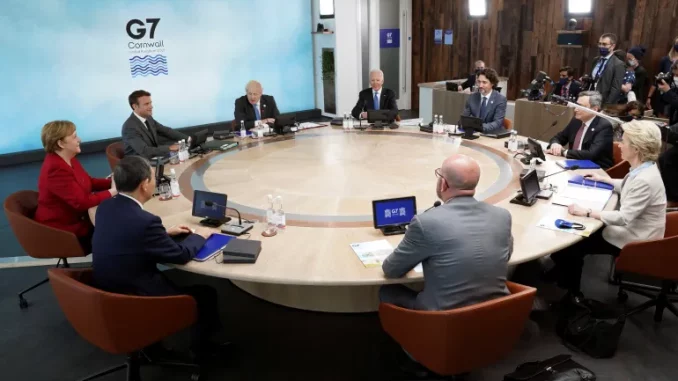
Introduction
In a momentous and long-anticipated display of global solidarity, the leaders of the Group of Seven (G7) nations have made a resounding commitment to donate one billion COVID-19 vaccine doses to less privileged countries. This pledge signifies a collective resolve to confront the glaring vaccine inequality that has cast a shadow over the world’s battle against the pandemic. The announcement, which comes after extensive discussions and mounting international pressure, has the potential to significantly reshape the course of the global vaccination campaign. In this comprehensive article, we will delve into the implications of this historic commitment and the prospects it holds for accelerating the global fight against the COVID-19 pandemic.
Addressing the Inequity in Vaccine Distribution
Since the inception of the COVID-19 pandemic, one of the most glaring disparities that the world has witnessed is the uneven access to vaccines between wealthy nations and their less affluent counterparts. High-income countries have secured massive quantities of vaccine doses through advance purchase agreements with pharmaceutical companies, while many low- and middle-income nations have grappled with limited access to even the most fundamental supplies.
The consequences of this vaccine inequality have been profound. Lower-income countries have encountered formidable challenges in vaccinating their populations, leaving them more vulnerable to the virus and its formidable variants. This stark imbalance in vaccine distribution has hindered global efforts to attain widespread immunity and bring an end to the pandemic.
The Pledge at the G7 Summit
The momentous commitment to address vaccine inequality came to fruition at the G7 Summit held in Cornwall, England, from June 11 to 13, 2021. The leaders of the world’s seven largest advanced economies made an unequivocal pledge to bridge the divide. They committed to donating a grand total of one billion COVID-19 vaccine doses to less privileged countries over the next year.
This substantial pledge encompasses both financial contributions and doses secured directly from vaccine manufacturers. In addition to these commitments, the G7 leaders also pledged their support to global vaccination efforts through substantial funding for the COVAX initiative. COVAX is a vital program designed to ensure that vaccines are distributed equitably among all nations, regardless of their income levels.
The Potential Impact of the G7 Commitment
The G7’s historic commitment to donate one billion vaccine doses is a remarkable stride toward redressing global vaccine inequality. Its potential impact is far-reaching and multifaceted:
- Saving Lives: Donating vaccine doses to less privileged countries has the potential to save countless lives. By facilitating the vaccination of more individuals, this commitment will offer greater protection against COVID-19’s devastating impact.
- Halting the Virus’s Spread: Widespread vaccination is a linchpin in the fight against COVID-19. It serves as a crucial means of controlling the virus’s transmission and curbing the emergence of new, potentially vaccine-resistant variants.
- Fueling Global Economic Recovery: Achieving a more equitable distribution of vaccines will not only alleviate the human suffering caused by the pandemic but also spur global economic recovery. As countries inoculate their populations, they can safely reopen their economies, restore international trade, and reignite travel and tourism.
- A Testament to International Cooperation: The G7 commitment is a compelling testament to the power of international collaboration in confronting global crises. It underscores the significance of nations working hand in hand to address shared challenges, transcending geopolitical boundaries.
Challenges on the Horizon
Despite the momentous nature of the G7 commitment, substantial challenges remain in ensuring the effective and equitable distribution of vaccines to those in need. Some of these challenges include:
- Logistical Hurdles: The safe and efficient transportation and distribution of vaccine doses to remote or underserved regions pose logistical challenges that demand meticulous planning and infrastructure investment.
- Vaccine Hesitancy: In some communities, vaccine hesitancy remains a formidable barrier to achieving widespread vaccination coverage. Public health campaigns and education efforts are essential to combat misinformation and build trust.
- Manufacturing Capacity: Expanding vaccine production capacity to meet the demands of global distribution is a complex task that necessitates collaboration between pharmaceutical companies and governments.
- Need for Broadened Commitments: While the G7 commitment is monumental, addressing vaccine inequality requires the engagement of a broader coalition of nations. More countries must come forward with similar pledges to fulfill the global demand for vaccines.
Conclusion
The G7 leaders’ pledge to donate one billion COVID-19 vaccine doses to less privileged countries is a landmark development in the struggle against the pandemic. It signifies a collective commitment to address the deep-rooted issue of vaccine inequality that has hindered global progress. Despite the hurdles that lie ahead, this commitment inspires hope that the world can unite to bring an end to the COVID-19 pandemic and alleviate its profound toll on humanity. It serves as a testament to the transformative power of international cooperation and the potential for concerted action to make a difference in the lives of millions around the globe.